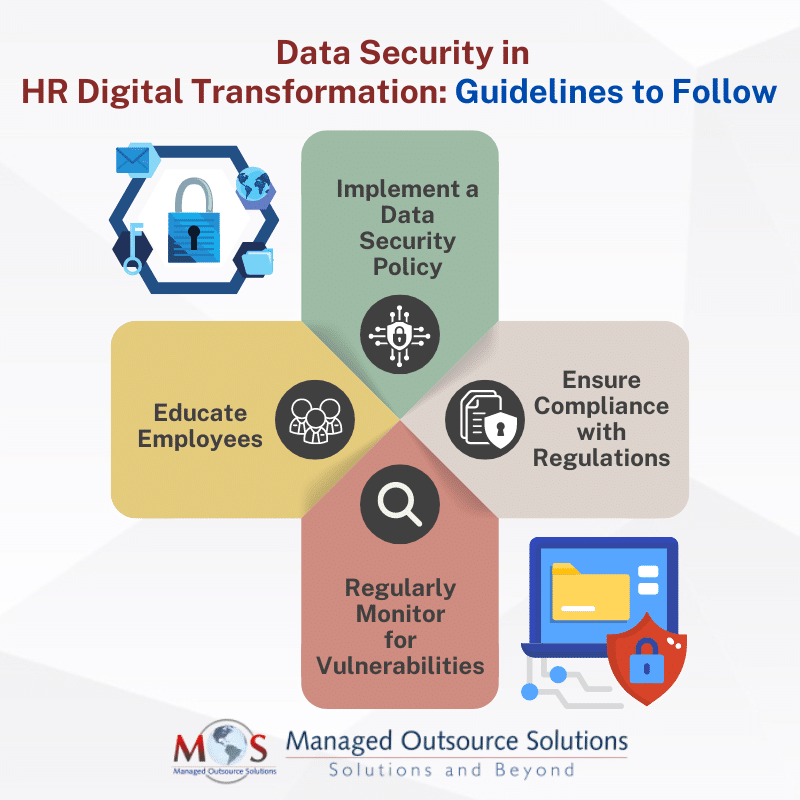Digitization is a key element of HR transformation, with artificial intelligence (AI) enhancing the experience in many areas. As technology advances, document scanning services have played a key role in helping HR departments to go paperless, increasing efficiency, compliance, and the employee experience. In addition to supporting the environment, reducing paper use streamlines and eases recruiting, employee onboarding, payroll management and employee benefits management.
The success of HR digital transformation depends on having the right people, technology and processes in place. As HR digitization comes with risk of data breaches that can compromise sensitive employee information, your organization must have appropriate data security and data protection policies in place, and evaluate these regularly.
This blog post discusses the benefits of HR transformation, the critical factors that can determine the success the initiative, and the challenges or risks involved.
Benefits of HR Digitalization
The integration of digital tools and platforms into HR processes offers several far-reaching benefits:
- Improved employee experience, driving engagement, satisfaction, and retention.
- Saves time spent on administrative paperwork
- Provides instant access to data from anywhere, speeding up workflow
- Frees up time to focus on strategic activities
- Allows leveraging data-driven insights to enhance workforce productivity, identify skill gaps, and predict future talent need
- Fosters unbiased recruitment and performance evaluations
- Promotes more informed decision-making
Global technology giant Siemens AG is a classic example of a company that has successfully implemented digital solutions to manage their HR processes efficiently, according to a HR Tech Series article. The company created a digital twin of its workforce. This allowed the HR department to simulate changes in the workforce size and skills set, and assess the impact on the organization in real time. This helped them make informed decisions about workforce planning and resource allocation.
While the prospect of a paperless human resources (HR) department can be an attractive proposition for many organizations, implementing such a system comes with significant challenges.
Tackling the Challenges of HR Digital Transformation
While a paperless human resources (HR) department can be an attractive proposition for many organizations, implementing such a system hurriedly can expose them to potential legal risks. Employment attorneys and practitioners interviewed by Bloomberg BNA, a leading independent provider of legal, regulatory, and business information, emphasizes that a successful paperless HR office must meet five core requirements: security, accuracy, reliability, accessibility, and compliance with relevant regulations. According to the experts, a HR office implementing electronic document conversion solutions should “implement checks, balances and controls” to make sure that they are doing things the right way.
Experts recommend that HR departments should pay attention to the following things when converting paper documents into electronic format:
- First, decide whether you want to go completely paperless or just want an electronic record of paper documents.
- Ensure that your paper records are legible, accurate and complete for conversion into electronic format.
- Preserve the original paper records of important documents (for example, the employee’s agreement) before converting them to digital. This is crucial for litigation purposes, even though federal and state law consider electronic signatures just as valid as ink signatures.
- Partner with a professional document scanning company that will ensure compliance with data privacy laws, records retention requirements, and other industry-specific regulations applicable to HR documentation.
- Take steps to ensure proper records management and compliance over the long term.
The movement from paper to digital systems in HR departments is accelerating as technology continues to improve. While this is transforming workflows, it also comes with a major challenge: data security.
Law firm Nockolds reported that employee data breach reports to the Information Commissioner’s Office (ICO) rose from 2,279 in 2022 to 3,208 in 2023 – the highest number of incidents since 2019. The report noted that data breaches increased by 41 per cent in 2023, reaching their highest level in five years. The BBC, British Airways, and Boots are among the organizations that were affected by a data hack that compromised employee details and banking information in 2023.
When there is a HR data breach, the impacts can be widespread and severe. Not only can a high-profile HR data breach lead to significant revenue losses, but it can also inflict lasting damage to the organization’s reputation and public standing. It can hamper future business opportunities and make it more challenging to attract top talent.
Data Security Best Practices for HR Departments
Remote work, use of mobile devices, chabots, and employee negligence expose HR data to security issues. To protect against breaches and cyberattacks, organizations need to implement robust measures to ensure HR data protection and compliance. This includes policies to safeguard sensitive employee data, educating employees on data protection best practices, and ensuring compliance with relevant laws and regulations.
Following these guidelines can ensure data security following HR digital transformation:
Implement a Data Security Policy
Develop and execute a dedicated HR Data Security Policy focused on confidentiality, integrity, and availability to safeguard sensitive information. Employees’ personal and health information that is digitally stored must be kept confidential and password-protected from unauthorized access. Printed documents should be stored properly and accessible only to authorized individuals.
Ensure Compliance with Regulations
HR departments must comply with relevant data protection regulations such as the General Data Protection Regulation (GDPR), California Consumer Privacy Act (CCPA), and Health Insurance Portability and Accountability Act (HIPAA).
Regularly Monitor for Vulnerabilities
Efficient HR data security involves identifying existing vulnerabilities in IT systems and taking steps to address any weaknesses. This can reduce the risk of data breach
Educate Employees
Creating a culture of data security awareness plays a vital role in HR data security. Educate employees on the importance of data protection, your organization’s data security policies and procedures, and the risks of mishandling data. Training programs should cover password protection, secure handling of confidential information, and reporting suspicious activities. Make sure that your digital system gives access to the employees or management in keeping with their rights or privileges.
Preserving metadata is crucial when converting HR documents to different file formats, particularly when moving from traditional office documents to PDF format. As it includes the identity of the author, the date a file was created, and when it was last accessed, meta data may be important for legal or compliance purposes. While Microsoft Windows-based documents automatically preserve metadata, it may get lost or corrupted when these files are converted to PDF format.
Organizations should consider partnering with an efficient document conversion company to ensure smooth transitioning to paperless, digital workflows. Selecting the right vendor can also mitigate potential security risks associated with outsourcing the digitization of sensitive HR documents.
Concerned about data security, accuracy, and compliance during document conversion?
We can help!





